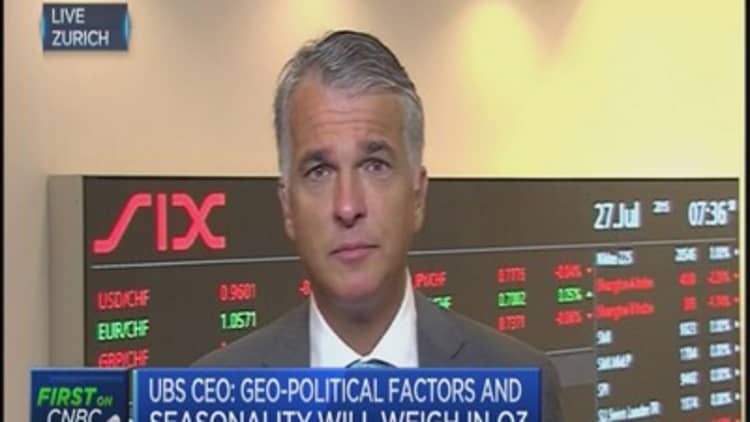After a week dominated by U.S. quarterly results, it's time for Europe's earnings season to get into full swing, and so far the signs are pretty upbeat.
"The Q2 results season is up and running and the early indications are positive," Robert Parkes, a strategist at HSBC Bank said in note published late last week. "In Europe the percentage of beats on EPS (earnings per share) is above average – 55 percent versus (a long-term average of) 48 percent."
Swiss bank UBS on Monday said its profits soared over 50 percent in the second quarter compared to last year, beating analyst expectations on positive contributions from all divisions and regions.
It comes after a number of other positive earnings surprises last week, including from French defence group Thales, which saw its shares hit a record high after posting first-half profits that beat expectations. British telecoms firm Vodafone also unveiled results that showed improvements in two of its major markets: the U.K. and Germany.
Read MoreUBS sees profit jump 53% after early earnings release
This week sees results from a slew of major European firms: Luxury retailer LVMH posts half year earnings on Tuesday; U.K. bank Barclays, GlaxoSmithKline, 3i, SKY and Man Group are on the calendar for Wednesday; followed by Germany's Deutsche Bank, Siemens and Lufthansa on Thursday.
On Wall Street
Last week, a host of major American companies, from Amazon, to Apple and American Express, posted quarterly earnings in a season that – so far – has been described as mixed.
"I think it's been mixed and that's telling you something about the U.S. economy – we're growing nicely but we're past the peak point in margins picking up. So it's now the bottom line that's coming through on earnings and at the same time there are headwinds such as currency strength," Richard Jeffrey, chief investment officer at Cazenove Capital, said on CNBC last week.

According to FactSet S&P 500 companies are currently expected to report a 2.2 percent drop in earnings for the second quarter, which would market the first earnings decline since the third quarter of 2012.
Read MoreAn energy jolt of a different sort: Why earnings are taking a hit
As such, analysts said the earnings outlook in Europe compared with the U.S. looked brighter than it had for some time.
"The European economy is picking up momentum and there may be a temporary blip in Q2 because of the crisis in Greece," Jeffrey said. "Look at what people predicted at the start of year, which was 1 percent (economic growth), and now they're talking about 1.5 percent so strength in the economy has taken people by surprise."
Turning point
A pick up in Europe's economic recovery and weakness in the euro, which is down about 18 percent against the dollar over the past 12 months, remain key factors in the positive outlook for corporate earnings in the euro zone, analysts said.
"The depreciation in the euro is the main driving force behind our forecast of a significant upside surprise on earnings in 2015," Parkes at HSBC said.
"Our forecast is for 25 percent earnings growth for Europe ex-UK; this is more than double the consensus expectation, which has been bouncing around in a range of 9-12 percent over the past six months."
Other analysts appeared to share that view, saying that while European stocks had risen this year, the outlook for earnings surprises may have been underestimated.
"Investors have been far too cautious on the outlook for European earnings and if we get a surprise it will be on earnings, which means European equities will outperform," Robert Parker, a senior adviser at Credit Suisse, told CNBC earlier this month, as the first European firms started to report their latest earnings.
The pan-European STOXX 600 index is up about 13 percent so far this year, compared with gains of around 4.6 percent on the – a broad measure of U.S. stocks – and a rise of roughly 16.6 percent on Japan's blue-chip Nikkei stock index.


